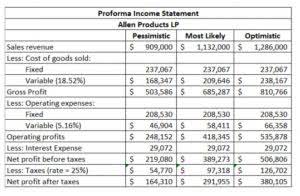
Copyright ©2024 MH Sub I, LLC dba Nolo ® Self-help services may not be permitted in all states. The information provided on this site is not legal advice, does not constitute a lawyer referral service, and no attorney-client or confidential relationship is or will be formed by use of the site. In some states, the information on this website may be considered a lawyer referral service. Please reference the Terms of Use and the Supplemental Terms for specific information related to your state.
- This includes docking an employee’s pay for full-day absences according to the employer’s paid sick or vacation leave policy, or during the employee’s first or last week of work.
- The new rules changed that, making either overtime pay or a higher annual salary a reality.
- It could also cause businesses to adjust their procedures so people work fewer overtime hours, giving employees more time back.
- The FLSA does not require payment for time not worked, such as vacations, sick leave or holidays (Federal or otherwise).
- Some states may have requirements for employee notification prior to termination or lay-off.
In a daily overtime state, he would be entitled to overtime pay for the four extra hours he worked on Monday, even though he didn’t come close to working more than 40 hours in the week. California and a handful of other states have a daily overtime standard, as well. This means that nonexempt employees are entitled to overtime for every hour beyond eight that they work in a day. For example, Alex wage earners are eligible for overtime after 40 hours per week worked is a non-exempt employee who works 12 hours on Monday and six hours on Tuesday (and doesn’t work any additional hours in the week). Because his total hours for the week do not exceed 40, he is not entitled to overtime under the weekly standard. To calculate overtime for a salaried employee, you must take the annual hours worked, 2,080 hours, and divide the income by it to get an hourly rate.
I wasn’t paid fairly for my work
“I suspect that such substantial increases may be a particular burden for many smaller businesses, forcing some to choose between cutting jobs and raising prices,” said Ted Hollis, a partner at Quarles & Brady, a law firm. “Some businesses that cannot do either may be forced to close, resulting in unintended but predictable side effects of this government action.” The salary threshold will be updated every three years, starting July 1, 2027, the agency said. • Commissioned sales reps are exempt when they earn more than 1.5X California minimum wage.

The new overtime pay law significantly increases the number of people who qualify for time-and-a-half pay for any hours they work beyond 40 in a week. Under the new law, salaried employees making less than $47,476 a year must be paid overtime. (Almost all hourly employees, regardless of their wage, are already entitled to overtime pay.) This new protection applies to almost anyone making less than $47,476, including salaried managers or professionals. Starting July 1, most salaried workers who earn less than $844 per week will become eligible for overtime pay under the final rule. And on Jan. 1, 2025, most salaried workers who make less than $1,128 per week will become eligible for overtime pay. As these changes occur, job duties will continue to determine overtime exemption status for most salaried employees.
Basic Overtime and Prevailing Wage Q & A –
The healthcare industry recognizes personal attendants as part of the medical system. Live-in attendants and non-live-in attendants find their overtime entitlements vary. Longer daily hours (9+), and more hours per week (45+) form the basis of the differences. A total of 8 hours were logged for Saturday under the electrician work classification with a base hourly pay of $12 per hour.
Court Orders Janitorial Company to Pay $10000 in Back Wages and Damages To 11 Employees After U.S. Department … – US Department of Labor
Court Orders Janitorial Company to Pay $10000 in Back Wages and Damages To 11 Employees After U.S. Department ….
Posted: Wed, 16 Dec 2020 08:00:00 GMT [source]
Your use of this website constitutes acceptance of the Terms of Use, Supplemental Terms, Privacy Policy, Cookie Policy, and Consumer Health Data Notice. For more additional assistance, check out our free overtime calculator. Authoritative, up-to-date data on the living standards of American workers. CWHSSA also applies to some federally assisted construction contracts if they are worth over $100,000 and subject to Davis-Bacon and Related Acts.
Requirements
Failing to comprehend the law is never deemed a valid excuse if an inspection results in citations for violating labor laws. This makes spending the time upfront to understand and train your payroll team worthwhile. According to the FLSA, hours worked on Saturdays, Sundays, holidays, or regular days of rest do not require overtime pay unless they constitute actual overtime hours. The FLSA defines a workweek as a period of 168 hours during 7 consecutive 24-hour periods. It can begin on any day and at any hour, and each workweek stands alone to calculate overtime. You can’t average 2 or more workweeks to calculate pay or determine overtime.

If a wage determination specifies an electrician’s hourly rate as $22 and their fringe rate as $5 per hour, then their total prevailing rate per hour for all straight-time hours worked under that work classification is $27. Calculate overtime for any hour exceeding 40 within the workweek, and do not incorporate the fringe hourly rate in this calculation. The new exemption threshold, while falling far below the recommendations of lawmakers and worker advocates, was praised because it includes automatic annual increases, meaning that it will grow over time. The rule, which would make workers earning up to $55,000 a year eligible for overtime, is intended to reverse four decades of reducing the number of workers qualified to earn overtime pay. As Capital & Main reported in a series of stories last year, overtime pay has steadily eroded, so that the percentage of workers eligible for overtime is now a fraction of what it was in the 1970s.
Which Employees Are Entitled to Overtime
That would have roughly doubled the level that was in place at the time. A prevailing wage is the wage rate, including fringe benefits, that is determined by government authorities to be the standard or average compensation for a particular job classification in a specific geographic area. Prevailing wages are typically established to ensure fair compensation for workers employed on government-funded construction projects or projects receiving government assistance. These wages are intended to reflect the rates that are prevalent or “prevailing” within a given locality for specific types of work. In California, overtime is 1.5 times the regular rate of pay for anything over 8 hours but under 12 hours in a single day.
- For instance, in some states, overtime kicks in after eight hours have been worked in a single day while in others it is after twelve hours or after 40 hours have been worked in a workweek.
- The main exceptions are those who aren’t covered by the Fair Labor Standards Act (FLSA), the federal law that sets overtime rules and other labor standards like the minimum wage.
- The department’s final rule, which will go into effect on July 1, 2024, will increase the standard salary level that helps define and delimit which salaried workers are entitled to overtime pay protections under the FLSA.
- Separately, the Federal Trade Commission issued a final rule Tuesday banning noncompete clauses, which proponents say will promote job-switching, higher wages, new businesses and innovation.
- In 2016, then-President Barack Obama asked the Labor Department to overhaul federal overtime rules and raise the salary threshold to $47,476 a year, or $913 a week.
- Domestic work does not include caring for persons in facilities, relatives, casual babysitters and others.